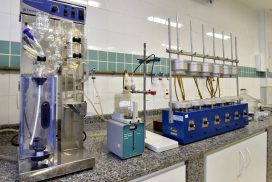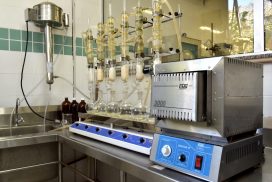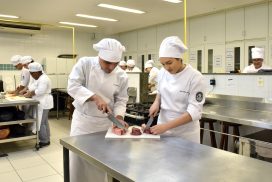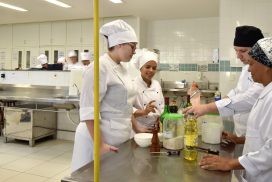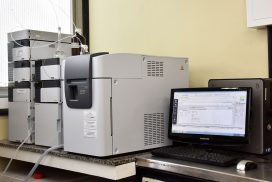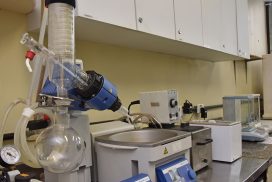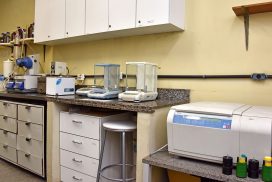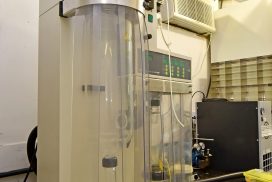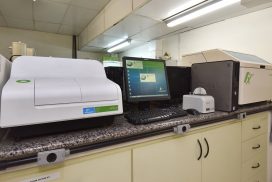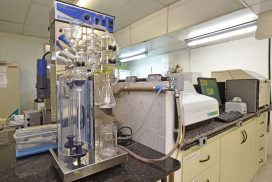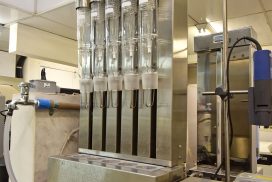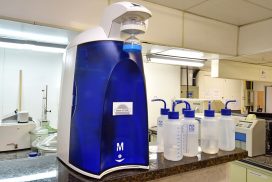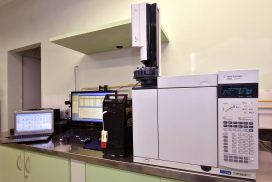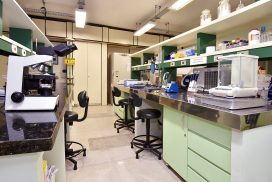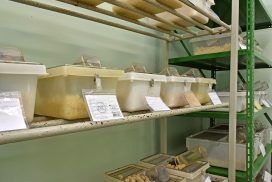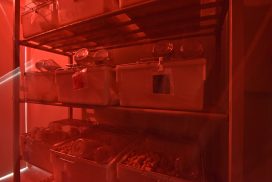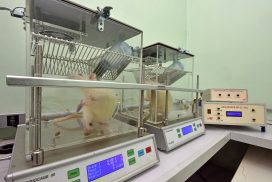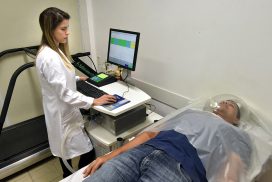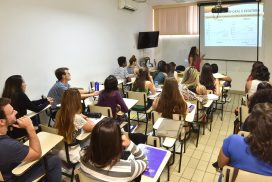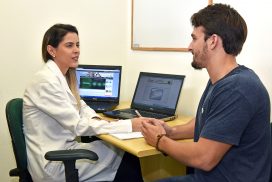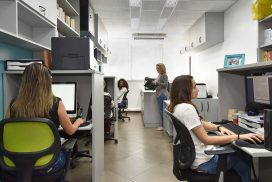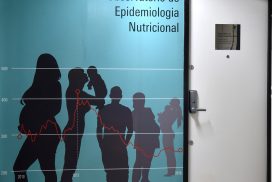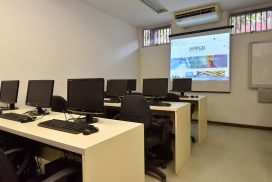Laboratories
Academic Structure
The PPGN-UFRJ has a laboratory complex, which allows the performance of teaching and research activities in the different areas of knowledge that make up the research lines of the program. The laboratory units are described below:
Food Analysis and Processing Laboratories
Location: Health Sciences Center, Block E, room 17
Coordinator: Professors Eliane Fialho de Oliveira and Mariana Monteiro
Set of three laboratories a) Physical and chemical analyzes of food; b) Food Technology; and c) Dietetic and Cooking Technique. They mainly serve the undergraduate teaching activities, the Nutrition and Gastronomy courses, and the postgraduate courses of PPGN. It was constituted for the scientific investigation on the different methods of preparation, conservation and processing and their effects on the nutritional and sensorial quality of foods and preparations. In these laboratories physical, chemical and physical-chemical analysis of food, as well as preparation and processing of food are carried out.
Main equipment
Knife mill; Soxhlet apparatus (lipids); Kjedhal apparatus (proteins); Mufla; Precision and analytical scales; Potentiometers; Distillers; Thermal baths; Drying greenhouses; Semi-industrial oven for food dehydration; Freezers; Refrigerators; Gas furnaces; Pots with stirrer; Vacuum Sealer; Microwave; Industrial stoves; Mixers and bench processors; Industrial blender.
Functional Food Laboratory (LABAFs)
Location: Health Sciences Center, Block J, 2nd floor, rooms 13 and 15
Coordinators: Professors Eliane Fialho de Oliveira and Mariana Monteiro
The projects developed in the LABAFs are characterized by the interface between Food Science and Nutrition Biochemistry and are developed in partnership with different UFRJ units (IQ, IMPG, IBqM, IPPN) and National (INCA, UFF , UNIRIO, UFRRJ, EMBRAPA) and International Research Institutions (Cornell University and Ohio State University).
The main research topics are: (i) characterization of bioactive compounds and investigation of antioxidant activity in foods of plant origin; (Ii) development of food products enriched in bioactive compounds; (Iii) the effect of high hydrostatic pressure on nutritional, sensory and microbiological quality of food; (Iv) Investigation of the metabolism and bioactivity of bioactive compounds in in vitro, ex vivo and in vivo models.
Main equipment
High performance liquid chromatograph coupled to photodiode array detector and mass spectrometer, spectrophotometer, refrigerated centrifuges, ELISA microplate reader, CO2/O2 incubator, BOD incubator, microscopes (fluorescence, optical and inverted), 3D bioreactor, class II biological safety cabinet, speedvac centrifugal evaporator, and tank and source for western blotting.
These devices allow the following analyses to be performed: identification and quantification of nutrients and bioactive compounds in food, analysis of urinary metabolites, cultivation and maintenance of cells in culture in a sterile environment, immunological analyses by ELISA, and protein expression studies by Western blotting. This structure has allowed the detailed characterization of bioactive compounds in food and plant extracts, aiming to understand the best ways of processing and/or extracting these compounds for application in studies in cellular models. There have also been advances in the detailed understanding of the bioaccessibility, metabolism, and bioactivity of bioactive compounds, in cellular models and in humans.
Laboratory for Food Development for Special and Educational Purposes (LabDAFEE)
Location: Health Sciences Center, Block J, basement, room 08.
Coordination: Professor Anna Paola Trindade Rocha Pierucci
This laboratory focuses on the application of micro and nanotechnologies for the development of innovative foods for special purposes in health, mainly for the performance and recovery of athletes. Micro and nanoencapsulation of food, nutrients and bioactive substances and analyzes of chemical, physical and biological characterization of foods are carried out.
It involves studies of nutritional intervention in animal and / or human experimental models, with a focus on physical exercise and high performance sports. Also within this scope are conducted observational studies on the nutritional, biochemical and metabolic aspects involved in the development of sports talents in the State of Rio de Janeiro.
The research and extension activities carried out at DAFEE are multidisciplinary and have collaboration with different UFRJ units (IQ, EQ, FF, IBQM, EEFD, IMA, IMPG), National Research Institutions (UFF, UFRJ-Macaé, INT), Confederations (CBPM, CBDA, COB), Sports Clubs (Fluminense Sport Club and Associação Atlética Portuguesa) and NGO (Fight for Peace). Food Education activities linked to the research and extension projects are carried out with the partner institutions.
Main equipment
Bone densitometer, bioelectrical impedance systems, indirect calorimetry system, biochemical analyzers, Nanodrop, ultracentrifuge, centrifuges, laboratory scale spray dryer, -80 ºC freezers, conventional anthropometry equipment.
These devices allow the following analyses to be performed: body composition, bone mineral density, energy expenditure, clinical and biochemical analyses, oxidative stress, purification of plant-based proteins, production of nanoemulsions and microparticles, formation of emulsions, and assessment of solubility and dispersibility. This structure has enabled the development of micro and nanocapsules of foods, nutrients, and bioactive substances, the development of plant-based protein foods, investigations of the relationship between body composition, energy metabolism, and physical performance, and of epigenetic mechanisms of diets, nutrients, and bioactive substances associated with physical exercise. Nutritional education actions are also developed to improve physical performance and promote sustainable diets.
Laboratory of Nutritional Biochemistry
Location: Health Sciences Center, Block J, 2nd floor, room 21.
Coordination: Professors Tatiana El-Bacha and Wilza Peres
The laboratory of nutritional biochemistry involves scientific research on the interactions between food / nutrients and metabolism, mainly in the maternal-infant context and lactation. Research involves both animal and human models. They have partnerships with different research centers of UFRJ and other higher education institutions, such as the Laboratory of Cellular Physiology of the State University of Rio de Janeiro and the Laboratory of Endocrine Physiology of the Federal University of São Paulo (UNIFESP).
Main equipment
Gas chromatograph equipped with split/splitless injector and flame ionization detector, thermal baths, spectrophotometer, centrifuges, ultrafreezers, real-time thermocycler, aseptic PCR booth, nanodrop, equipment and accessories for Western blotting analysis, high-resolution oximeter, sample homogenizer with capacity for batch preparation, speedvac, optical microscope, incubators, fume hood, CO2 incubator, biological safety cabinet (Class II A2 laminar flow).
This structure has allowed the development of projects with animals, humans and cells in culture, dedicated to the study of biochemical and physiological mechanisms that associate diet and nutritional interventions with the etiology of chronic and infectious diseases and that allow the identification of health and disease biomarkers. The structure of the nutritional biochemistry laboratory allows for the shared use of many pieces of equipment and has high-throughput analytical capacity for sample preparation, determination of the fatty acid profile in numerous types of biological samples, application of molecular biology techniques and functional studies.
BIONUT
Location: Health Sciences Center, Block J, 2nd floor, room 19.
Coordination: Professor Fátima Sardinha
Vivarium, which supports the development of different lines of research in the experimental area. Recently, this laboratory was reformed to allow the animal experimentation in rats and in mice, being the environment fully adapted to the management of both species. New equipment was acquired through partnership in collaborative studies involving physical exercise, with Professor João Pedro Saar Werneck de Castro, of the School of Physical Education and Sport (EEFD) and University of Miami.
Main equipment
Conveyor belts; Calorimeter for metabolic analysis; Metabolic and common cages; Cage-adapted drinking fountains; Feeders coupled to cages; Rooms and vestibules with control of temperature and luminosity; Guillotine; Gas chamber; Extruder for the preparation of feed.
The BIONUT vivarium has a structure that is 100% suitable for animal experimentation on rats and mice. BIONUT was considered the best vivarium in the CCS in terms of ergonomics and suitability of animal health criteria.
Digital Food Education Laboratory (LADIG'E)
Location: Health Sciences Center, Block J 2nd floor, room 18
Coordination: Professor Maria Cláudia da Veiga Soares Carvalho
LADIG’E is a laboratory that develops in-depth studies on food education at the interface with the Human Sciences in the transmidious context of contemporary culture.
Nutritional Assessment Laboratory (LANUTRI)
Location: Facilities of the UFRJ Central University Restaurant – Av. Carlos Chagas Filho, s / nº – Downstairs – Cidade Universitária – Rio de Janeiro – RJ.
Academic Coordination: Professor Dra. Aline Ferreira
Technical Coordination: Dr. Vanessa Chaia Kaippert
Its mission is to contribute to the dissemination of knowledge in the area of nutritional assessment and promote health in the collective and individual spheres by encouraging the adoption of healthy dietary practices, nutritional diagnosis and the training of human resources in nutritional assessment. Nutritional assessment and food education activities, individual or collective, are carried out for the UFRJ community (technical-administrative servants, teachers, students and service providers), through institutional projects, in addition to training and qualification of human resources to use different methods of nutritional assessment. The LANUTRI facilities are used for the scientific research of the PPGN, which involves intervention and nutritional evaluation. In an integrated way to the LabDAFEE, they form a Research Unit in studies of the energy metabolism and human nutritional biochemistry of the Institute of Nutrition Josué de Castro / UFRJ. This laboratory has a multidisciplinary team with teaching representativeness of all PPGN research lines.
Main equipment
Vmax indirect calorimetry system for metabolic analysis in humans; Treadmill for analysis of the energy expenditure in exercise; Electrocardiogram; Platform scales; Digital scales; Portable stadiometer; Portable Infantometer; Bio-impedance devices; Portable stretcher.
Laboratory of Research and Innovation in Sports Sciences - LAPICE
Location: University Center – Block C – rooms 201 and 202 – UFRJ campus Macaé.
Coordination: Professor Beatriz Gonçalves Ribeiro
In this laboratory are conducted intervention studies and nutritional evaluation of humans, in the context of sports science.
Its mission is to contribute to the dissemination of knowledge in the area of nutritional assessment and to promote health, both collectively and individually, by encouraging the adoption of healthy eating practices, nutritional diagnosis and training of human resources in nutritional assessment. Nutritional assessment and food education activities are carried out individually or collectively for the UFRJ community (technical-administrative staff, teachers, students and service providers) through institutional projects, in addition to training and qualification of human resources for the use of different nutritional assessment methods. The LANUTRI facilities are used for scientific research by the PPGN, which involves nutritional intervention and assessment. Integrated with LabDAFEE, they form a Research Unit for studies of energy metabolism and human nutritional biochemistry at the Josué de Castro Nutrition Institute/UFRJ. This laboratory has a technical team composed of three nutritionists and a multidisciplinary team with faculty representation from all lines of research at the PPGN.
Main equipment
Ergo spirometer VO2000 Inbramed; Master Inbramed Treadmill; Inbramed Automatic Defibrillator; Biodynamics 450 Bi-Impedance Bio-impedance Apparatus; Lange adipometer; Tanita portable digital scale; Portable Bioimpedance Digital Scale; Automatic blood pressure device; Blood pressure device; Bioplus Bio 2000 Semi Automatic Analyzer.
Observatório de Epidemiologia Nutricional
Location: Health Sciences Center, Block J, 2nd floor.
Coordinator: Professor Gilberto Kac and Professor Dayana Rodrigues Farias
Currently, the researchers of the Observatory of Nutritional Epidemiology, are involved in four projects. Two of these projects are already in the recruitment and data collection phase:
The improve trial: This is a viability clinical trial in partnership with the University of Westminster (London), Parker Institute (Denmark), Rio de Janeiro State University (UERJ) and Instituto Fernandes Figueiras (FIOCRUZ). The effectiveness and cost-effectiveness of a multicomponent intervention that addresses the fortification of calcium and vitamin D milk and periodontal therapy in oral health and the improvement of the metabolic and inflammatory status of low-income pregnant women with periodontitis are being investigated. Women are evaluated in the 2nd and 3rd trimesters of gestation and postpartum. In addition, vitamin D will be quantified in infants with blood collected in the Guthrie test.
Bioactive compounds of breast milk and association with maternal health and child development: it is a cohort of pregnant women and their children. The objective of this study is to evaluate the composition of human milk in terms of microbiota, immunological compounds and oligosaccharides and its association with maternal outcomes, as well as the growth and development of the child up to one year of age. Socio-demographic information, nutritional status, clinical and biochemical parameters, mental health, expenditure and level of physical activity will be collected. The entire project will be carried out through collaboration with primary care. The project has a partnership with Columbia University (United States).
The 3rd project is scheduled to begin recruitment and data collection in October this year:
MILQ (Mothers Infants and Lactation Quality): International multicenter study in five countries: Brazil, United States, Denmark, Bangladesh and The Gambia. This project is in the phase of questionnaires and protocols reviews with prediction for the beginning of the capture of the pregnant women in October of the current year. It aims to establish reference values for micronutrient concentrations in human milk based on data from women with adequate nutritional status and not supplemented. This is a cohort study with four follow-up waves with onset in the immediate postpartum and performed up to 9 months of the child’s life. Socio-demographic, reproductive and lifestyle information, mental health and child cognitive development will be collected, as well as biological samples such as feces, urine, blood and saliva. This study is funded by the Bill & Melinda Gates Foundation and the coordinating center is located in the United States at the United States Department of Agriculture (USDA).
The 4th ongoing study is the validation of the growth curves proposed in the Intergrowth-21st for the Brazilian population. The main goal of this study is to develop and evaluate the applicability of new recommendations for gestational weight gain from the Intergrowth-21st curves for women classified with eutrophy or overweight according to pre-gestational body mass index for future implementation in the Unified Health System. An additional objective is to suggest recommendations for gestational weight gain for the first trimester of pregnancy and for women with low weight and pre- not contemplated in the Intergrowth-21st curve.
Main equipment
Complete workstations, computers, notebooks, equipment for anthropometric and body composition assessment of children and adults, and portable devices (tablets) for data capture. They also have -80 ºC freezers, connected to a power generator, ensuring the integrity of the stored biological samples.
The research developed has enabled the implementation of a new booklet for monitoring gestational weight gain in the Unified Health System. In addition, it has contributed to the generation of data on breastfeeding practices, food consumption, anthropometric nutritional status and epidemiology of micronutrient deficiencies in children up to 6 years of age. Advances are also being extended to anthropometric assessment and investigation of the prevalence of anemia in the biological mothers of these children. Multicenter studies (Brazil, Denmark, Bangladesh and Gambia) are also being conducted with the aim of establishing reference values for micronutrients in human milk and investigating the association between bioactive compounds in milk, maternal health and child development.
Researchers INJC
Professor Maria Beatriz Trindade de Casto; Professor Aline Alves Ferreira.
GIPEPON - Interinstitutional Group of Research in Populations Studies in Nutrition
Location : Health Sciences Center, Block J, 2nd floor.
Coordination: Professor Rosângela Alves Pereira
The evaluation of the nutritional status of individuals and communities is indispensable in studies that aim to understand the health and life conditions of a population. In this way, the Institutes of Research in Population Studies in Nutrition – GIPEPON – integrates professionals engaged in projects that have in common methodologies with the proposal of diagnostic investigation of the nutritional situation of the Brazilian population, including anthropometric, biochemical, clinical, dietetic and socioeconomic conditions. The group concentrates its research activities in Nutritional Epidemiology that compose one of the five lines of research of the Graduate Program in Nutrition of the INJC, developing studies on the nutritional status of individuals and communities and their determinants; food consumption of population groups and their determinants; nutrition and health of children and adolescents; obesity and eating disorders; food and nutritional security and studies on poverty and its repercussions on the nutritional status of the Brazilian population. GIPEPON is registered in the CNPq Research Group Directory.
Main Equipment
Stadiometers, electronic scales, adipometers, electrical bioimpedance, and computers installed with software for statistical data analysis for the analysis of food consumption data. The studies developed have advanced the understanding of health and nutrition outcomes, identifying the determinants of chronic non-communicable diseases, metabolic disorders, nutritional status, and dietary consumption patterns. Data collected in the field and epidemiological data obtained through various types of studies (longitudinal, observational, and intervention research) are used to propose nutritional interventions that minimize health-related problems.
Researchers INJC
Gloria Valeria da Veiga; Rosana Salles da Costa
GISAN - Interdisciplinary Study Group on Food and Nutrition Security
Location : Health Sciences Center, Block J, basement.
Coordination: Professor Rosana Salles da Costa and Professor Aline Ferreira
Main Equipment
Materials for videoconferencing, portable recorders and computers with statistical programs (Stata, Mplus, Stat Transfer) for analyzing databases.
The group is dedicated to studying research on Food and Nutrition Security (FNS), focusing on the debate on the impact of social inequalities on Food Insecurity (IA) and Water Insecurity (IH). The studies involve investigating these indicators in socially vulnerable groups, indigenous peoples, quilombola populations, trans populations, and PcD. They have partnerships with IBGE, MDS and MS, as well as researchers from several national and international research institutions. The results from the research developed have supported public policies in the area of Food and Nutrition Security, contributing to the debate and decision-making of bodies and councils in the area of Nutrition, such as CONSEA. The studies have also generated results on hunger and poverty in Brazil, directly contributing to the Brazil Without Hunger Plan.
Micronutrient Research Core – NPQM
Location: Health Sciences Center, Block J, sub-soil.
Coordinator: Professor Andrea Ramalho
Study of micronutrient deficiencies in the population considered classic risk (maternal-infant group), besides studying their associations with infectious and chronic non-transmissible processes in different population segments and biological moments.
Researchers INJC
Wilza Peres; Taís Lopes; Avany Fernandes.
External Researchers
Andréa Cardoso Matos; Silvia Elaine Pereira; Carlos Saboya Sobrinho.
Computer Laboratory of Graduation (LIG)
Location: CCS headquarters building, Block J, 2nd floor, room 06
It is intended for students who are regularly enrolled in the INJC’s Nutrition and Gastronomy Undergraduate course, in order to carry out academic tasks for students and for practical undergraduate teaching activities. Place of academic activities and research of students of scientific initiation linked to PPGN.
Main equipment
The LIG is equipped with 8 workstations, each with a computer connected to the local network and the internet, as well as access to a scanner and printer.
Post-graduate Computer Laboratory (LIP)
Location: CCS, Block J, underground, room JSS 01.
It is intended for students regularly enrolled in the INJC Postgraduate courses, including the master’s and PhD academic studies of the PPGN. This lab is also used to hold classes in which internet resources are needed.
Main equipment
Computers; Laser printer; Interactive board; Multimedia projector.Computadores; Impressora laser; Quadro interativo e Projetor multimídia.
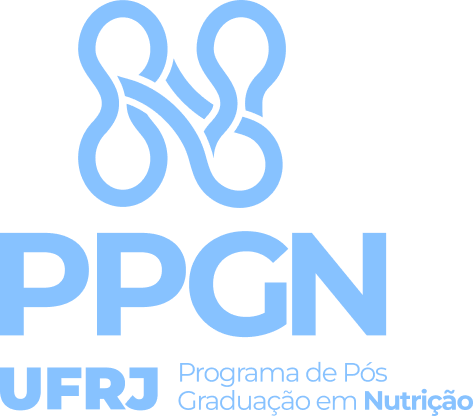
Instituto de Nutrição Josué de Castro – Nutrition Institute – UFRJ
Av. Carlos Chagas Filho, 373 – Bloco J 2° andar Cidade Universitária, Rio de Janeiro, RJ CEP 21941-902
Tel 55 21 3938 65 99
Secretaria de Pós-graduação – Academic Office
Av. Carlos Chagas Filho, 373 – Bloco J 2° andar, sala 09 Cidade Universitária, Rio de Janeiro, RJ CEP 21941-902
Tel 55 21 3938 6603
Pro-Reitoria de Pós-Graduação e Pesquisa – Vice-Rector of Research and Pos-graduation
www.pr2.ufrj.br

